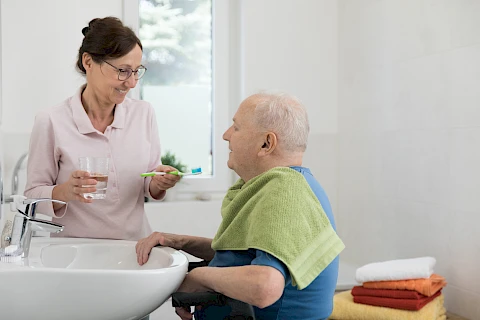
Maintaining proper hygiene is vital for all individuals, but it can pose unique challenges when caring for seniors with Alzheimer's. Changes in memory, cognition, and judgment often lead to difficulties around personal cleanliness and grooming. As a caregiver, understanding these struggles and finding effective ways to manage them can significantly improve the quality of life for your loved ones.
Senior Helpers Northeast Atlanta will discuss the importance of maintaining a calm and patient approach, using positive reinforcement, and creating a comfortable environment to encourage hygiene practices. Our goal is to provide caretakers with practical strategies to manage resistance to hygiene in seniors with Alzheimer's, contributing to their overall health and well-being.
Resistance to Hygiene in Seniors With Alzheimer's
Resistance to hygiene in seniors with Alzheimer's often results from fear, confusion, and memory loss related to their disease. Recognizing signs of resistance, such as hostility or refusal to cooperate, is essential to providing appropriate care.
This resistance is usually a reaction to the overwhelming challenges brought on by Alzheimer's, not a personal choice. With patience and understanding, it is possible to manage these barriers.
Strategies for Managing Resistance to Hygiene
A primary strategy for managing resistance to hygiene is positive reinforcement. This could be as simple as complimenting their cooperation, or offering a favorite activity or treat afterward. Positive reinforcement transforms hygiene rituals from a challenging task into a more pleasant experience.
Creating a comfortable environment is also important. Keep the room warm, use soft towels, and ensure sufficient lighting. Play soothing music and reduce noise and distractions. Encouraging a sense of familiarity can also make seniors with Alzheimer's more receptive to hygiene routines.
Adapting your approach to hygiene routines can also minimize resistance. Tailor hygiene practices to suit the individual's personal preferences and past routines. This flexibility can make the experience less intimidating and more acceptable.
Promoting a sense of control is crucial. Offering choices wherever possible, like whether they want to brush their teeth before or after their bath, can help seniors feel less powerless and more involved in their care.
Practical Tips for Caretakers
Establishing a predictable routine can alleviate anxiety in seniors with Alzheimer's. Consistent timetables for bathing, brushing teeth, and other hygiene activities can provide a comforting structure.
Utilizing distraction and redirection can be helpful during confrontational moments. For instance, a conversation about a favorite topic might distract them while you assist with washing their hands.
Seniors with Alzheimer's often struggle with confusion, fear, and frustration. Keeping a cool head, even in the face of resistance, can create a more positive atmosphere and pave the way for cooperation. Handling difficult situations with grace comes with time and practice. Remember, every day may not be perfect, and it's okay to seek help when needed.
Contact Senior Helpers for Custom Caregiving Support
A calm, patient approach with positive reinforcement and a comfortable environment can greatly reduce resistance to hygiene. However, there will be challenging days, and it's important to be patient with both the individual with Alzheimer's and with yourself.
If you live in Cumming, Duluth, Suwanee, Norcross, or Peachtree Corners, know that you're not alone in this journey. Senior Helpers Northeast Atlanta is here to support you. Contact us to learn more about our senior care services.